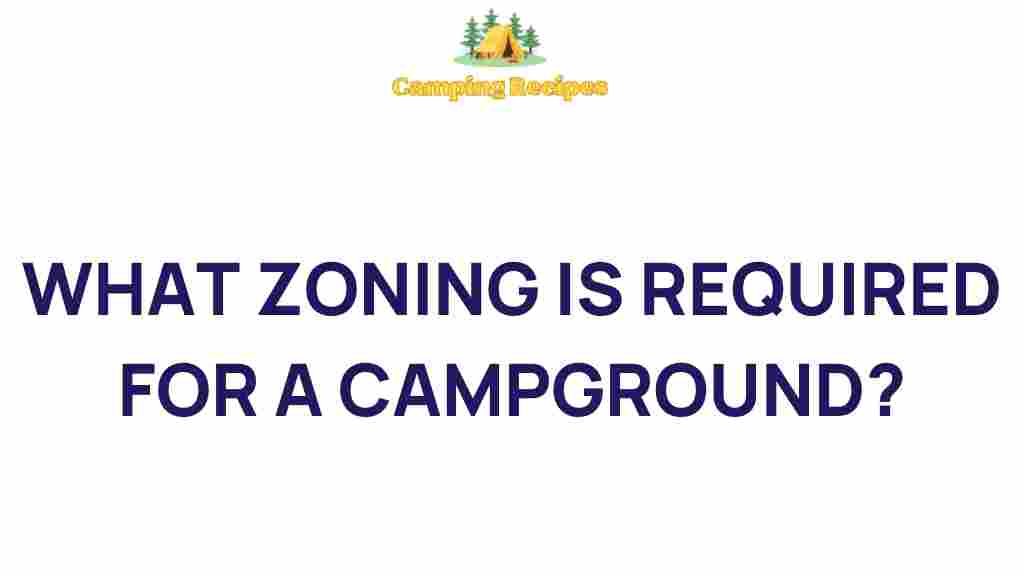Zoning Requirements for a Campground
When considering the development of a campground, understanding the zoning requirements is crucial. The process may seem overwhelming, but it is essential for ensuring that your campground operates within the legal framework established by local governments. This article will unveil the secrets behind the necessary zoning and campground regulations you need to know before embarking on this outdoor recreation journey.
Understanding Zoning and Land Use
Zoning refers to the legal restrictions placed on a piece of property that dictate how it can be used. These regulations are determined by local government authorities and can vary significantly from one area to another. The primary purpose of zoning is to organize land use in a way that promotes orderly development and minimizes conflicts between different uses of land.
For campgrounds, specific zoning classifications will often apply, such as:
- Residential Zones: Often do not permit campgrounds.
- Agricultural Zones: May allow campgrounds under certain conditions.
- Commercial Zones: Typically more flexible and may include campgrounds.
- Recreational Zones: Specifically designated for outdoor recreation and often the most favorable for campgrounds.
The Importance of Permits in Campground Development
Once you have determined the appropriate zoning classification for your campground, the next step is to secure the necessary permits. Permits are legal documents that grant permission to undertake specific activities in accordance with local regulations. Here are some common permits you may need:
- Land Use Permit: Confirms that your intended use aligns with local zoning laws.
- Building Permit: Required for any structures you plan to build, such as cabins or restrooms.
- Environmental Permits: Ensures compliance with environmental regulations to protect local ecosystems.
- Health Permits: Necessary if you plan to provide food services or sanitation facilities.
Step-by-Step Process for Securing Zoning and Permits
Now that you understand the basics of zoning and permits, let’s go through a step-by-step process to guide you in securing the necessary zoning and campground regulations for your project.
Step 1: Research Local Zoning Codes
Start by researching the zoning codes applicable to your property. You can typically find this information on your local government’s website or by visiting the planning department in person. Familiarize yourself with:
- Allowed uses in each zoning district.
- Setback requirements and density restrictions.
- Specific regulations that apply to campgrounds.
Step 2: Prepare Your Site Plan
Once you have a clear understanding of the zoning regulations, prepare a detailed site plan for your campground. This should include:
- Layout of campsites.
- Location of facilities (restrooms, showers, etc.).
- Access roads and parking areas.
- Natural features (trees, water bodies, etc.).
Step 3: Application for Zoning Approval
Submit your site plan along with an application for zoning approval to the local planning authority. This may involve:
- Filling out an application form.
- Providing necessary documents (site plans, environmental assessments, etc.).
- Paying an application fee.
Step 4: Public Hearing
In many cases, a public hearing will be scheduled where community members can voice their opinions about your proposed campground. Prepare for this by:
- Gathering community support.
- Addressing potential concerns (noise, traffic, environmental impact).
- Presenting the benefits of your campground for outdoor recreation.
Step 5: Final Approval and Permits
After the public hearing, the planning authority will make a decision regarding your application. If approved, you will receive a zoning permit, and you can then apply for any additional permits needed for construction and operation.
Legal Requirements and Community Impact
Understanding the legal requirements for operating a campground is vital not only for compliance but also for fostering positive relationships with the community. Ensure you are aware of:
- Building codes and safety regulations.
- Health regulations regarding sanitation and food services.
- Noise ordinances to minimize disturbances to nearby residents.
The impact of your campground on the local community can be significant. A well-planned campground can:
- Boost local tourism and economy.
- Provide recreational opportunities for residents.
- Encourage environmental stewardship and appreciation for nature.
Troubleshooting Common Issues
Even with thorough planning, you may encounter obstacles during the zoning and permit process. Here are some common issues and how to troubleshoot them:
- Rejection of Zoning Application: If your application is denied, review the reasons for denial, address the concerns raised, and consider reapplying.
- Community Opposition: Engage with local residents to understand their concerns and work to address them through modifications to your plan.
- Permit Delays: Stay in contact with the permitting office to ensure you are aware of any missing information or requirements.
Conclusion
Understanding the zoning and campground regulations is essential for successfully developing a campground. By following the outlined steps and being proactive in addressing community concerns, you can create a thriving outdoor recreation spot that benefits both visitors and the local community. Remember to stay informed about land use regulations, apply for the necessary permits, and comply with all legal requirements to ensure a smooth process. For more information on zoning and land use, you can visit the American Planning Association. If you need assistance with campground planning, check out our planning guide.
This article is in the category Tips and created by CampingRecipes Team
